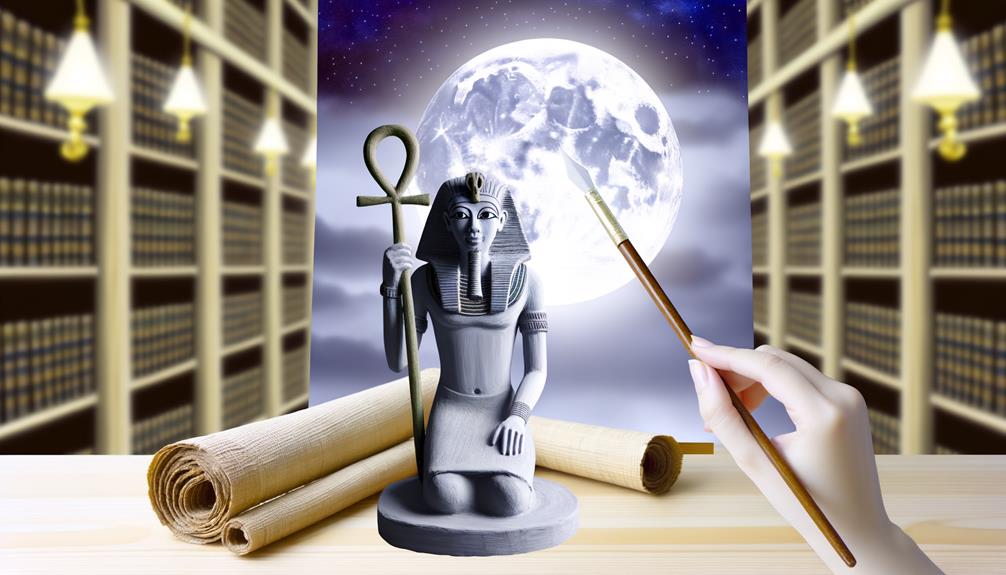Have you ever heard about Thoth, the ibis-headed deity from ancient Egypt? He's not just any god, he's considered the god of wisdom and writing, and even the divine judge of the universe, taking care of the delicate balance between good and bad. Known as the first-ever writer and the inventor of language, Thoth documents all cosmic events.
But there's more to him that you might not know. Thoth is believed to be the guardian of the Akashic Records, a spiritual database of every thought, occurrence, and feeling that has ever existed. This makes him a channel for a magnitude of wisdom and knowledge that goes beyond our earthly life.
So, if we dive deeper into Thoth's teachings and wisdom, we can gain unmatched understanding about our past, present, and future. This can help us reach a comprehensive knowledge of our life. Sounds fascinating, doesn't it? Why not join us on this exciting journey of knowledge and self-understanding?
Thoth's Mythological Origin

You might be wondering, "Where did Thoth, the god of wisdom of old Egypt, come from?" Well, the stories about the birth of Thoth, Egypt's wisdom god, are quite varied and captivating. Some tales tell us that Thoth was self-made, a concept that really highlights his unparalleled wisdom. In other tales, he's depicted as the dedicated aid to the sun god, Ra.
Thoth's divine wisdom is further showcased by the fact that he's credited with the creation of hieroglyphs, the revered language of old Egypt. As the ruler of Divine Words, he passed on this powerful communication tool to humans. So, it's not really a shocker that Thoth is seen as the patron of scribes. His talent for recording the stories and actions of other gods was truly admired.
In one of the more complicated tales, Thoth is described as being born from the head of Seth, after Seth ate a lettuce that Isis had inseminated. Despite the complexity of this narrative, it really underscores Thoth's special role in the pantheon of old Egyptian gods, as a symbol of divine wisdom and a vital connection between humans and the divine.
The Wisdom of Thoth
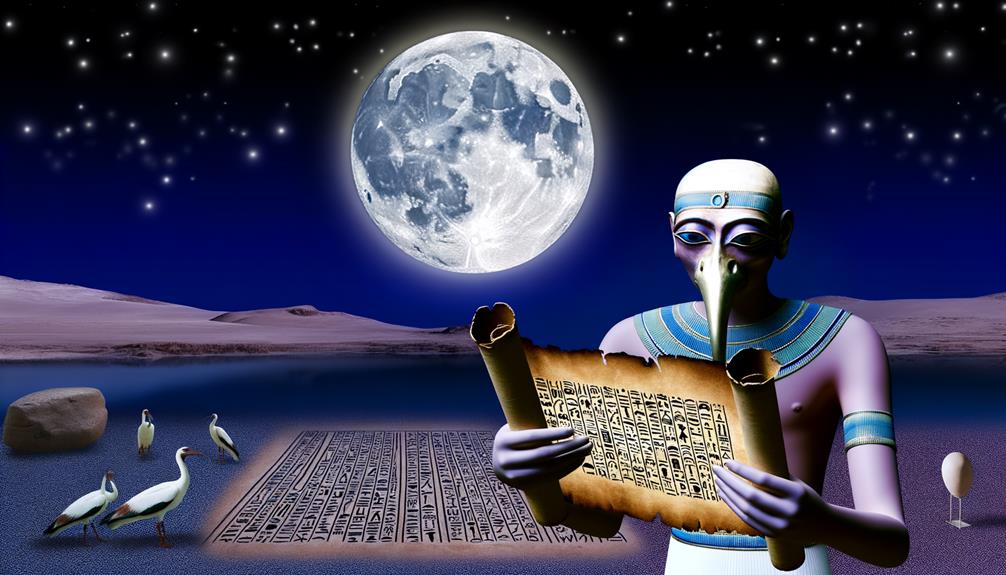
Exploring the wisdom of Thoth reveals his deep understandings and teachings had a significant impact on the spiritual and cultural dynamics of ancient Egypt. Thoth, an Egyptian deity, is recognized as the god of writing, the moon, and wisdom. His function as the scribe in Egyptian mythology emphasizes his association with knowledge and wisdom.
The insights of this god of wisdom were primarily unveiled in the Book of Thoth, a holy text believed to hold the universe's secrets. It was believed that anyone who read the book could comprehend animal language, see the gods in their true form and acquire knowledge of past and future events.
Thoth's wisdom was also encapsulated in the Thoth tarot, a card deck overflowing with rich symbolism that portrays ancient Egyptian ideas, gods, and mystical experiences. Each card is seen as a visible expression of Thoth's wisdom, directing people towards a more profound comprehension of themselves and the cosmos.
Thoth's Influence on Language
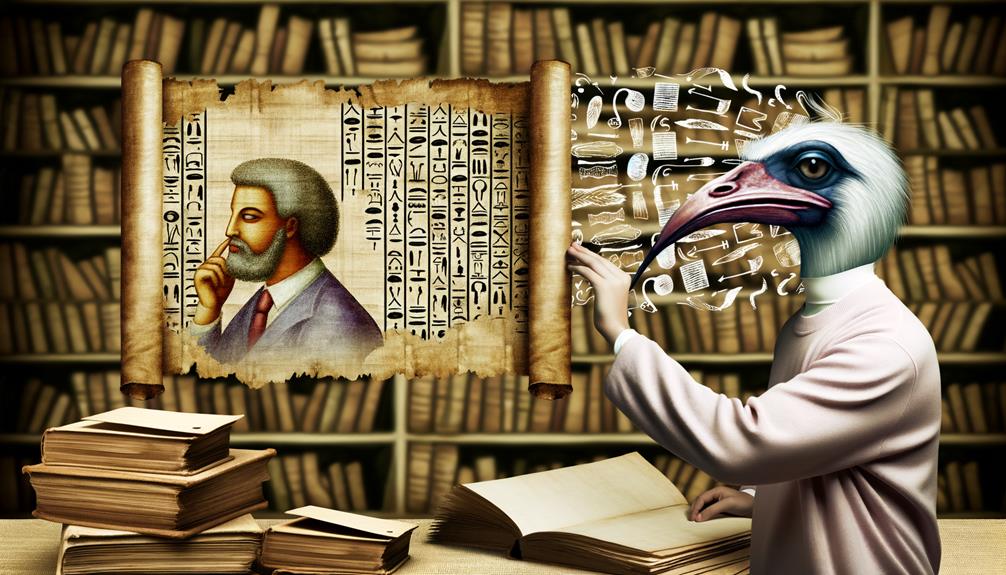
The wisdom of Thoth, the ancient Egyptian god, holds a significant place when discussing the evolution of language. He is often credited with the invention of writing and hieroglyphs, which played a pivotal role in communicating and preserving the tales of the gods. Thoth's influence on language is multi-faceted and includes:
- His ties with the Akashic Records, which sparked curiosity about the power of language to express profound understanding.
- His representation as a man with the head of an ibis or baboon, signifying the link between wisdom and communication.
- His contributions to the Hermetica, a group of texts attributed to him that had a strong impact on Western philosophy.
Often referred to as the Egyptian Hermes or Hermes Trismegistus (meaning Thrice Great), Thoth was highly respected for his wisdom. His influence on language also encompassed the concept of Maat or cosmic order, and his teachings made their way into the Book of the Dead. As we examine Thoth's wisdom further, we begin to realize the extent of his impact on language and the formation of our understanding of written communication.
Symbols and Epithets of Thoth
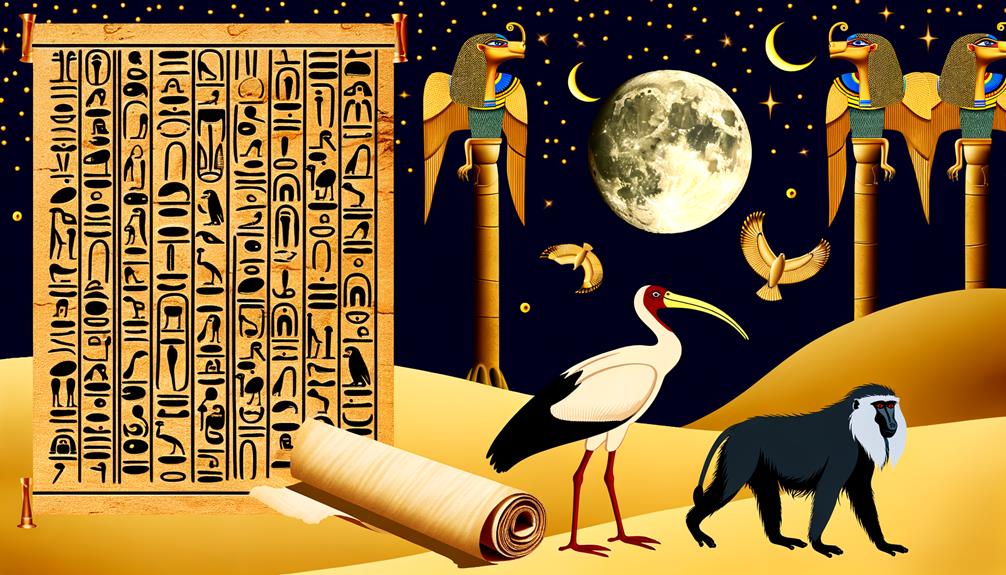
Let's chat about Thoth, the ancient Egyptian deity, and the symbols and titles associated with him. Each one is like a clue, shedding light on his divine duties and wisdom. Often portrayed as a man with the head of an ibis, Thoth is seen as a figure of immense knowledge and wisdom among the Egyptian gods. His depiction as such is tied to his role as the 'god of wisdom.'
One of Thoth's most significant symbols is the moon, which highlights his title as the 'Moon god'. The moon, with its regular transformations yet unchanging presence, reflects Thoth's job in upholding the equilibrium of the universe. His connection with the moon has another layer too – it relates to his duty in judging the souls of the departed, guiding them towards the afterlife.
Those who worshipped Thoth considered him the 'Lord of the divine words,' emphasizing his control over language and writing. His influence spills over into recording the history of ancient Egyptian Gods, safeguarding their tales and wisdom.
To sum it up, the symbols and titles linked to Thoth help us understand this multifaceted deity on a deeper level. They shed light on Thoth's wisdom, enriching our perception of his role and importance among the Egyptian gods.
Thoth in Modern Spiritual Practice
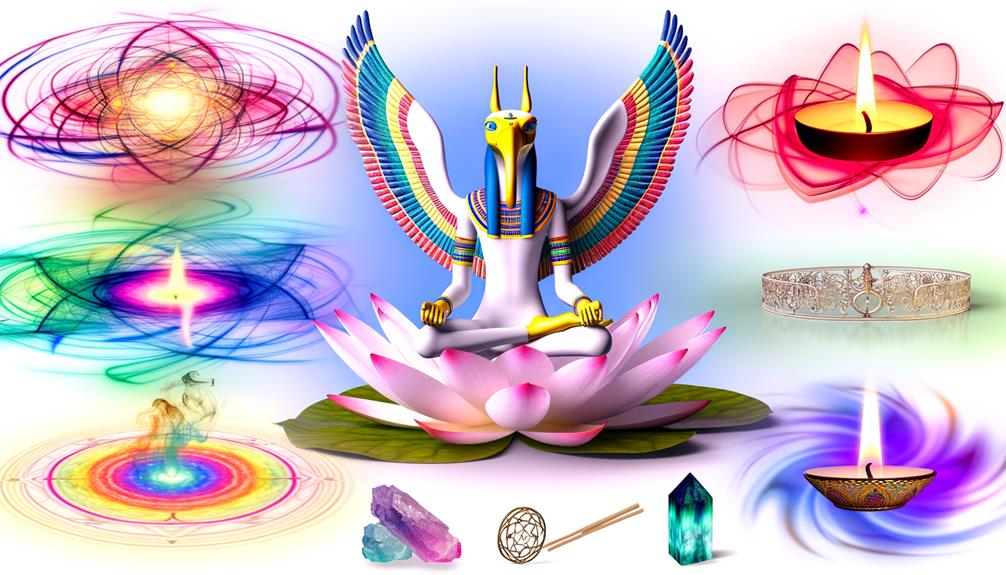
Ever wondered how the wisdom of Thoth influences today's spiritual practices? Thoth, the Egyptian god of Time, was a significant figure for the ancient Egyptians. This deity is also known as the lord of time. His wisdom, timeless as it is, has found its way into modern spiritual practice.
In today's spiritual circles, Thoth continues to command respect as a source of wisdom and knowledge. His insights, often referred to as Thoth wisdom god insights, carry a lot of weight. Here are some ways in which this becomes apparent:
- The teachings of Thoth, kept alive through the symbolic language of the Egyptian Book, continue to inspire those seeking wisdom.
- The Temple of Thoth, though a relic from history, still draws many who wish to feel his energy.
- Thoth's magical powers are frequently called upon in current rituals and magical practice.
- His Greek equivalent, Hermes, is worshipped in Hellenistic religions, further spreading Thoth's influence.
The wisdom of Thoth breaks through the boundaries of time, linking ancient knowledge with those who seek it today. His Egyptian name, Thoth, is still uttered with respect, his wisdom sought in the pursuit of spiritual growth.
Frequently Asked Questions
What Are the Facts About Thoth the God of Wisdom?
I've spent a lot of time poring over the details of Thoth, the Egyptian god of wisdom, in my role as an Egyptian mythology enthusiast. Thoth is well-known as the god of writing and wisdom. He also holds the title of the keeper of the Akashic Records. When you come across depictions of Thoth, you'll often find him portrayed with the head of an ibis or a baboon.
What Is Thoth's Connection to Humanity?
Thoth holds a deep-rooted relationship with us humans. Known as the custodian of wisdom, Thoth plays the role of a mentor, helping us navigate the intricate maze of life. He acts as our bridge to previous existences, assisting in our healing and growth in this present life journey.
Who Did Thoth Give Advice To?
Thoth, the ancient Egyptian god, was kind of like an advice guru in his time. People came to him when they needed some direction in life, especially during big life-changing events. He was also the go-to for scribes who needed a little inspiration in their work. Even now, his wisdom continues to inspire folks, including big names like Isaac Newton.
What Is the Teaching of Thoth?
In my research, I've come to understand that the teachings of Thoth focus on wisdom, healing, and guiding individuals towards their highest potential. Acting as the guardian of the Akashic Records, he provides valuable insights into our life decisions and experiences from past lives.

